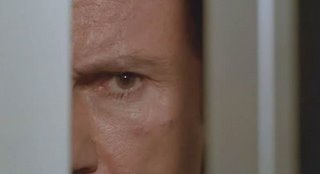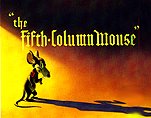NOTE: THIS ENTRY HAS BEEN SALVAGED FROM THIS SITE AND REPOSTED UNEDITED ON 5/15/2008. SOME INFORMATION MAY BE OUTDATED, AND OUTGOING LINKS HAVE NOT BEEN INSPECTED FOR REPUBLICATION. COMMENTS CAN BE FOUND HERE.
 I'm something of a late bloomer when it comes to my cinephilia. My family never had cable television, we didn't have a VCR until well into the 1980s, and throughout high school I only went to a few movies a year, usually of the sci-fi blockbuster variety. I was much more interested in computer games and music during my teen years, and I was practically oblivious to Frisco's diverse and thriving film culture. Ironically, this city boy had seen precious few non-Hollywood films until attending a small liberal arts college that offered free film and video screenings to students as partial compensation for living in a small Midwestern town with few cultural offerings attractive to its would-be-sophisticated student body. Suddenly I had easy access to screenings of films totally off my radar screen: Drugstore Cowboy, L'Enfant Sauvage, My Twentieth Century, Alice in the Cities, etc. I enjoyed going to see films I knew nothing about beforehand, but to be honest few of them floored me. I was still much more interested in music, including the healthy campus band scene.
I'm something of a late bloomer when it comes to my cinephilia. My family never had cable television, we didn't have a VCR until well into the 1980s, and throughout high school I only went to a few movies a year, usually of the sci-fi blockbuster variety. I was much more interested in computer games and music during my teen years, and I was practically oblivious to Frisco's diverse and thriving film culture. Ironically, this city boy had seen precious few non-Hollywood films until attending a small liberal arts college that offered free film and video screenings to students as partial compensation for living in a small Midwestern town with few cultural offerings attractive to its would-be-sophisticated student body. Suddenly I had easy access to screenings of films totally off my radar screen: Drugstore Cowboy, L'Enfant Sauvage, My Twentieth Century, Alice in the Cities, etc. I enjoyed going to see films I knew nothing about beforehand, but to be honest few of them floored me. I was still much more interested in music, including the healthy campus band scene.Every weekend could be counted on to provide at least dorm party or house party featuring one or more of the many rock (or punk, metal, noise, funk, or jazz) bands made up of students. It seemed as if there were almost as many bands as there were students, but my favorite was the Shepherd Kings. What they lacked in traditional charisma or virtuoso musicianship, they more than made up for in creativity and eagerness to do absolutely anything to make their shows entertaining. Every show was an event that culminated in a whirlwind of purgative screaming, insane robots, amplified feedback, mass chaos and destruction and some kind of material, whether animal or vegetable or mineral, interacting with (okay, usually "thrown at") the audience. But along the way the Kings played a selection of well-crafted songs with titles like "Radiation" and "Jacques Cousteau". I always looked forward to a driving death march called "Lieutenant Bad", clearly inspired by the Abel Ferrara film Bad Lieutenant. Here's a link to an mp3 of a live recording of the song, which in 1997 was released on CD by Gourmandizer, a now-defunct indie label:
"Lieutenant Bad"
I suspect I get more out of listening to that than people who've never seen a Shepherd Kings live show might. I've probably heard the song a hundred times and I still can't make out a good portion of the lyrics being shouted in tag-team fashion by Jason Elbogen and Mike Kraus. I've pieced together that each line ticks off another debased transgression of "a corrupta police officera" (I want to say that bassist Jack Simpson was in my Latin class, but I could be misremembering, as I never knew any of the band members very well personally), including "breeding disease", "dealing angel dust", and being "dirtier than the streets". It's true that Johnny Breitzer's drumming is anything but metronomic, and it may help to be able to visualize what his playing style actually looked like. I'm sorry I'm unable to provide that image.
I'm not sorry, however, that today's Ferrarathon finally prodded me to see my first Abel Ferrara film, a decade after the Shepherd Kings played their last note, and after seeing the likes of Ed Gonzalez and Zach Campbell praise the director almost from the beginning of my entry into full-fledged cinephilia in the late 1990's. In writing about Bad Lieutenant it's tempting to model my form on that of the song, and list the countless transgressions of the Harvey Keitel character (referred to in the film only as "LT") in the approximate order they appear in the film. First: when he drops his kids of at school, he snorts some coke as soon as they've gotten out of the car. Then: we see him run into a fire trap apartment building, perhaps to chase down a perp? No, it's to score drugs from one of his regular dealers. Next: he stops a convenience store hold-up, but only to order the shopkeeper out the door and submit the robbers to a shakedown. Etc. Is there a single shot of LT in the film in which he isn't pictured doing something immoral, illegal, or at least grossly irresponsible?
It was an intensely disturbing film for me to watch. This is really a genre I try to avoid: an absolutely humorless character study, in which the character is inexorably descending into a drug-filled pit of Stygian torment. I usually just find them depressing, and compounded with my squeamishness around images of graphic self-destruction through substances (a reaction that kicked into high gear quite often during this film), it's really no wonder I'd put off seeing this for so long. The lead character's unchecked misogyny was extremely uncomfortable, too. If it wasn't for Ferrara's extremely stylish (though never over-stylized) direction, I wouldn't have been able to bear the film and its subject matter at all. Shot after shot won me over with its conjuring of a heightened reality. And some scenes conveyed a drugged-out unreality; at one point LT tenderly kisses his dealer's mamá after receiving a cash bribe big enough to make his gambling debts seem potentially far less disastrous. It feels for a moment like it might be a turning point for LT; the woman speaks only Spanish to him but exudes a maternal grace that seems like it could spark his salvation. But no, the very next scene is an expressionist nightmare; strung out on something clearly taken just after leaving the dealer's apartment, he staggers down the stairwell like Cesare let out of Caligari's cabinet.
The other aspect of the film that made it all worthwhile was, strangely, the ending. Yes, MAJOR SPOILERS are on their way. I've never been a Catholic or an especially religious person, but I found something very moving and beautiful about LT's nihilistic "redemption". The key scenes are the ones between LT and his fellow cops; at a grisly crime scene they're more interested in talking about their National League pennant bets than in doing their jobs or really dealing with the death and lawlessness surrounding them. Later, LT shows that he's spiraled much further out of reality than his fellow officers have, when he accuses the Catholic Church and Major League Baseball of being "a racket" in practically the same breath. First the Church is corrupt and a nun's rapists unworthy of the high bounty placed on their heads, then baseball is so fixed that the Mets must keep winning in order to force a game seven and raise more advertising revenue. It makes perfect sense that such a corrupt cop would see everything as a racket. So why does he keep putting his money on the Dodgers? Two possible reasons: either he is in such a self-destructive cycle that he wants to lose his bets and ultimately his life. Or, he doesn't really believe in the fix after all and wants his fellow substance abuser and traitor to New York, Darryl Strawberry, to hand him salvation with a Dodger victory. Either interpretation has fascinating repercussions for the end of the film; if it's self-destruction LT wants, it's self-destruction LT gets by mainlining heroin and parking his car in front of Trump Tower after sending his lifeline on the next bus out of town. But if the baseball Championship isn't fixed, then perhaps neither is Catholicism, something LT finally seems to admit just before the famous appearance of Jesus at the end of the film.
Whether LT is motivated by faith or by a suicidal urge, or by a twisted combination of the two (I tend to think it's this third option), I found something appealing about the neatness of the ending that I don't usually get out of most films of this genre. It works because LT is so clearly a fictional creation, where so many substance abuser movies focus on real or reality-based people. Somehow it's cathartic for this character who was never really portrayed as fully human but more as a personification of the most selfishly depraved human tendencies, to be able to be released from his abject existence. I won't go so far as to say I found the end uplifting, but at least it was a kind of relief. I really don't expect I'll ever want to see Bad Lieutenant again, but I'm very glad I saw it this once.
And I'm excited to try out more of Ferrara's work. Like Michael Guillen I hope Mary is among the titles announced as part of the 49th SFIFF tomorrow. And I definitely plan to explore more of the director's filmography with aid of this Blog-a-Thon. Ms. 45 and New Rose Hotel seem like the most likely next candidates for me to track down.
 One last note: in one scene of Bad Lieutenant two children are watching a cartoon on television. A song plays: "We Did It Before and We Can Do It Again." The cartoon is the Fifth Column Mouse and it was directed by the most underrated of the great Warner Brothers cartoon directors, Friz Freleng, creator of Porky Pig, Yosemite Sam, the Tweety and Sylvester team-up, Bugsy and Mugsy, the Pink Panther and a huge animated legacy. Despite sources to the contrary, I understand 2006 is Freleng's centennial year, and I haven't heard a peep about it from anywhere other than my mouth. Would anyone be up for a Friz Freleng Blog-a-Thon sometime between now and Freleng's August 21 birthday?
One last note: in one scene of Bad Lieutenant two children are watching a cartoon on television. A song plays: "We Did It Before and We Can Do It Again." The cartoon is the Fifth Column Mouse and it was directed by the most underrated of the great Warner Brothers cartoon directors, Friz Freleng, creator of Porky Pig, Yosemite Sam, the Tweety and Sylvester team-up, Bugsy and Mugsy, the Pink Panther and a huge animated legacy. Despite sources to the contrary, I understand 2006 is Freleng's centennial year, and I haven't heard a peep about it from anywhere other than my mouth. Would anyone be up for a Friz Freleng Blog-a-Thon sometime between now and Freleng's August 21 birthday?





No comments:
Post a Comment